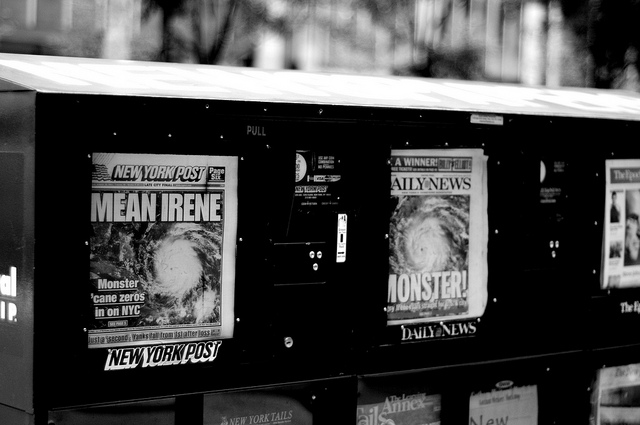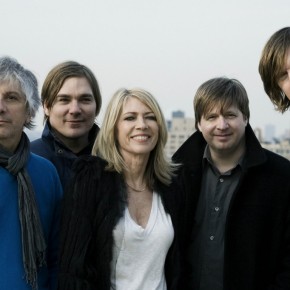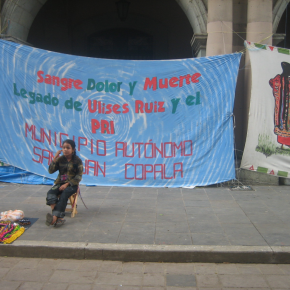Sometimes the mud stirred up by a storm contains gold. Sometimes it just shoots out the Superfund sludge that should have been cleared a half century ago.
Sitting in a post-Katrina New York, bracing myself for the arrival of Hurricane Irene, I turned to Grooveshark for the obvious song, Chris de Burgh’s ironically apropos Waiting for the Hurricane, from 1981.
Suddenly there’s a movement to the telephone
But noone’s calling home tonight
They’ve taken out the very last flight
And closed down the borderline
Cos there ain’t no place to hide
Waiting for the hurricane.
It’s a fantastically evocative song about journalists and holidaymakers stranded on a Caribbean island waiting for a hurricane to blow itself over. They are out of luck and out of touch. Waiting’s narrative has a plaintive edge to it, but de Burgh sticks brilliantly to the storyteller’s maxim of showing their desperation, not telling it.
Wait! Chris de Burgh? Famous for Lady in Red? Surely you’re joking? Maybe the 1986 album Into the Light, which contained that most drippingly sentimental of songs is somehow redeemed by his ballad, For Rosanna, dedicated to his daughter who went on to become the 2003 Miss World, Rosanna Davison. But no, such vicarious redemption is surely not what I’m talking about as gold stirred up by the storm.
And yet, gentle reader, it is exactly the reputation of Chris de Burgh that Hurricane Irene can do something to untarnish. That he is remembered for the unrepentantly sappy “Lady in Red” is less de Burgh’s problem and more the fault of the crass record-buying public that bought it in bucket-loads, presumably not to play, but to give to other people who might be impressed with the sentiment. But, by Into the Light, de Burgh was already well into decline.
You wouldn’t judge Stevie Wonder by his pop drivel I Just Called To Say I Love You without taking into account “I Wish,” “Superstition” and “Signed, Sealed, Delivered, I’m Yours.” And you shouldn’t judge Chris de Burgh without listening to “Spanish Train” or “Patricia the Stripper” on Spanish Train and Other Stories or to the collection of songs on 1984’s Man on the Line, when he briefly abandoned medieval and romantic themes for decidedly 1980s topics, such as the Cold War and business takeovers.
For, unlike Stevie, the blind god of funk, Chris de Burgh was the unheralded king of the fable. And, although he occasionally veered off into pompous or sentimental waters, when he got it right, he got it right. A Spaceman Came Travelling is flawed genius, erring on the sappy side, but Spanish Train remains a classic modern troubadour tale. God and the Devil play cards and bet on a railwayman’s soul and, because he cheats, the Devil, wins. It’s high drama written beautifully and sung with a tongue stuck plausibly near the cheek. Like Johnny Depp in the Pirates of the Caribbean series or like cross-dressing in British pantomime, it’s played for fun, but with high seriousness.
In “Patricia the Stripper,” from the same album, de Burgh’s tongue slips more firmly into his cheek. A rip-roaring tale of heterosexual bawdiness excused because the highest courts are in cahoots, the song proceeds with pace, panache and wit. The stripper is exonerated by a judge of her nakedness (for which the police have arrested her) because, spoiler alert, “This girl was in her working clothes!” It’s a relatively simple story but it’s beautifully told. Compare it with, say, Shaggy’s comic story hit, It Wasn’t Me:
All this time she was standing there
Picture this, we were both butt naked
For the pain that I’ve caused
Saw me bangin’ on the sofa (It wasn’t me)
It’s funny. It has a great beat. I love Shaggy’s performance of it, but when all’s said and done it doesn’t have the verbal dexterity of de Burgh’s comic tale.
Man on the Line — probably de Burgh’s last good album before he was ruined by the weight of his own schmaltz — has, as with all albums, some hits and some misses but plays all with a deft touch. “High on Emotion” is a song about falling in love that plays all the right notes without being particularly convincing:
Eyes are holding right across the room,
High explosion coming out of the blue;
In fact, listening to it again, twenty years on, it seems a little desperate, especially when listening to Much More Than This which I always thought was a song about deep love — “It would take much more than this to shake a love so long in the making” — but which I now see is fairly blatantly a song of not even apology, but explanation for cheating:
Sometimes the man in me gets lonely,
When I am away from you,
And in the darkness of another hotel room,
If there’s someone in the night saying,
‘It’s gonna be alright’ to ease away the pain of missing you,
What can I do?
But Moonlight and Vodka is a tender ballad, a story of an American in Moscow who has all but given up to the brutality of the weather and conditions rather than the political situation. The Ecstasy of Flight is a more convincingly metaphorical evocation of romantic love than High on Emotion which captures the danger of the night and the transgressions of liaison. It’s not a new theme, but the fact that desire and sex are clichés doesn’t stop any of us from exploring their dangers. No one has time to watch all the new vampire movies and shows, but surely one of them has used that song.
Again revisiting a theme heavily visited since Ancient Rome, Head and the Heart (featuring 1980s pop keyboard avatar of 7Up’s Fido, Howard Jones) explores the mind body opposition. It’s slightly sigh-y, but well executed. Taking it to the Top is a quintessentially 1980s story about businessmen destined to be “champions of the world” who are “heading for the greatest day that they have ever seen / Selling bridges to the Japanese.” The satire is barely concealed, but not in Japan, where de Burgh has been huge over most of the past five decades.
But it’s the rock ‘n’ roll storylines of Transmission Ends and Sound of a Gun (featuring the guest vocals of Tina Turner, really!) that are the biggest surprise. They are dystopian songs about mutual assured destruction and the end of life as we know it. It’s really a two-song package that begins with the gloriously dated: “I have seen the diamond stylus cut a groove from north to south.” Then everyone fights and dies and, at the end, with the final narrator holding onto his love, the last two people on Earth, transmission ends, with the beep stuck in the final groove of the LP, not ever quite ending, but always flagged as doing so.
So, as Irene spirals its way viciously up the Eastern seaboard, it’s worth thinking about the stories that pop music used to tell. Not just the straightforward ones about boys and girls meeting, nor even occasional ones about men or women meeting in slightly more complicated venues to indulge in something less trite than monogamous heterosexuality, but sometimes about politics, or about the anti-humanism of business. Often these songs would be told in tones that were less than straightforward and would employ metaphors that were actually difficult. But, sometimes a cigar is just a cigar and, on occasion, the hurricanes that characters are waiting for — they’re just hurricanes.
Photograph by Jijo Thomas. Published under a Creative Commons license.





